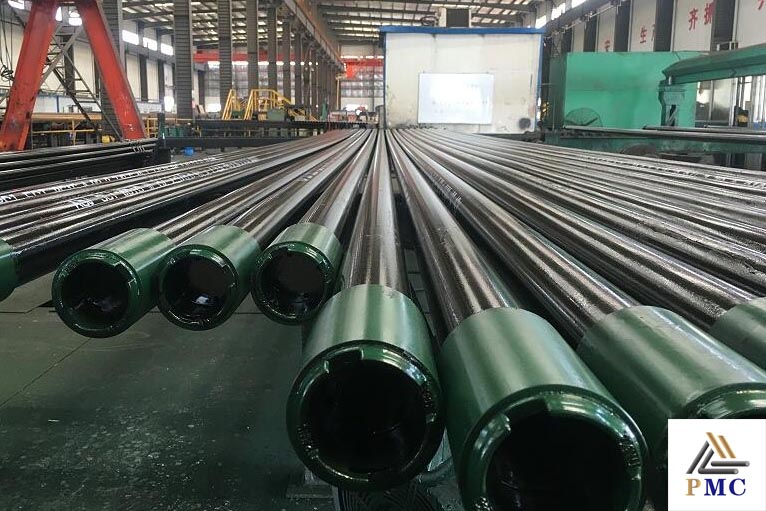
Oil Casing Steel Grade and Acceptance Standard
Common steel grades for casing: API J55 K55 N80 L80 C90 T95 P110 Q125 S135 V150
Common steel grades for tubing: J55 N80 L80 C90 P110
In addition, there are special steel grades such as M65, HCN80, HCP110 and TP110SS.
L80 is divided into L80-1, L80Cr9 and L80Cr13
For oil casing pipes of different steel grades, different color rings or ribbons are used to mark the coupling (for example, green is J55 or K55, orange is N80 or L80, and white is P110).
During the production process of the tubing body, proper heat treatment, non-destructive testing (NDT), hydrostatic pressure test, thread testing, etc. must be performed.

Grades of OCTG Casing Pipe
OCTG casing is manufactured in various grades, each with its own unique characteristics, in order to meet the needs of specific applications. Common grades of OCTG casing pipe include API J55, K55, L80, N80, P110, Q125, S135 and V150. Let’s look at these grades in more detail.
J55
API J55 casing is a general-purpose grade that is the most commonly used grade for oil and gas wells. It is known for its affordability and versatile nature. It is usually selected when cost is the main consideration. J55 casing has relatively low yield and tensile strength properties, ranging from 73,000 psi to 92,000 psi respectively. It is often used in shallow wells that require only modest pressure containment or when there is little risk of hydrogen sulfide corrosion.
K55
K55 casing is slightly stronger than J55 and is classified as a medium-strength grade. It is best suited for use in shallow wells with less stringent containment and corrosion requirements. It is also more durable and can withstand greater pressure than J55. It has an average yield strength of 82,000 psi and an average tensile strength of 110,000 psi. It is often used in onshore wells requiring medium tensile and yield strength.
N80
N80 casing is a higher grade than L80 and offers superior strength and performance in depths of up to 20,000 ft. It is most commonly used offshore and has an average yield strength of 85,000 psi and an average tensile strength of 100,000 psi. It provides superior protection against corrosion making it an ideal choice for deep, high-pressure wells.
L80
L80 casing is a higher-strength grade than J55 and K55. It combines good strength and toughness in one grade. It is particularly suited for sour service operations and is often used offshore. It has an average yield strength of 83,500 psi and an average tensile strength of 95,000 psi. It provides superior corrosion resistance, making it ideal for deeper wells with higher pressure loads.
P110
P110 casing is the highest grade of OCTG casing available. It combines exceptional strength and ductility, with an average yield strength of 105,000 psi and an average tensile strength of 125,000 psi. It is most commonly used offshore and is suitable for depths of up to 30,000 ft. It is also highly resistant to corrosion and offers superior pressure containment capabilities.
Q125
Q125 casing is a premium-grade product with exceptional strength and ductility. It is often selected for demanding applications, such as extreme depths and high pressures. It has an average yield strength of 115,000 psi and an average tensile strength of 140,000 psi. It is most commonly used in offshore wells, but can also be found in some onshore wells.
S135
S135 casing is the preferred material for extreme-depth applications, such as ultra-deepwater wells. It is known for its superior strength and ductility and is able to withstand extremely high pressures. It has an average yield strength of 125,000 psi and an average tensile strength of 155,000 psi. It is also highly resistant to corrosion and is therefore ideal for the most extreme conditions.
V150
V150 casing is the strongest grade of OCTG casing available. It has an average yield strength of 135,000 psi and an average tensile strength of 165,000 psi. It is designed to withstand the highest pressures and depths, and is most often used in ultra-deepwater wells. Its superior strength and durability make it an excellent choice for challenging drilling operations.
The tubing is divided into flat end tubing (NU) and outer thickened tubing (EUE) according to the end form.
There must be no folds, hair lines, delamination, cracks, folds and scars on the inner and outer surfaces of the oil casing. These defects shall be completely removed, and the removal depth shall not exceed 12.5% of the nominal wall thickness.
The chemical composition and physical properties should comply with the latest edition of the American Petroleum Institute API SPEC 5CT. For chemical analysis, prepare samples according to the latest version of ASTME59, and perform chemical analysis according to the latest version of ASTME350. Physical properties should be hydrostatic pressure test, flattening test, sulfide stress corrosion cracking test, hardness test (as specified in the latest version of ASTM E18 or E10), tensile test, transverse impact test (as specified in the latest version of ASTM A370, ASTM E23 and related standards) ), grain size determination (ASTME1 12 latest version or other methods).
Conclusion
By understanding the grades of OCTG casing available, you will be able to make an informed decision when selecting a casing grade for your well. Choosing the wrong grade for your project can cause problems, so carefully consider the needs of your well and choose the grade that best suits your project application.
Go here to learn more about "How to Distinguish the Thread of Oil Casing Pipe?"


